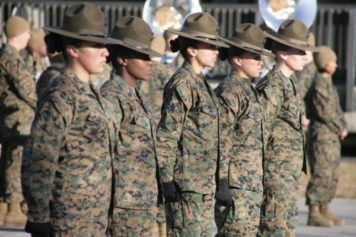Pughsley Lane takes immeasurable pride in knowing that he helped make history and change American culture as one of the Montford Point Marines.
Their contributions to the Marine Corps and to the nation were celebrated during Veterans Day services on Monday.
Lane had graduated from Ambler (Pa.) High School in 1943 and knew that, at some point, if he did not enlist, he would be drafted. With World War II raging, Lane said the choice was easy.
“I enlisted because it gave me the choice of which branch of the service I would go into, and I wanted to be a Marine,” he said. “They were the best, and I wanted to be one of the best. I had three friends who were already in the Marines.”
Lane’s friends, however, where white.
Blacks had been barred from the Marine Corps until 1942, after President Franklin D. Roosevelt signed an executive order to change that, ignoring the objections of Marine leadership, who believed that African-Americans could not meet the corps’ high standards.
They were soon proved wrong by the thousands of blacks who, like the Buffalo Soldiers and Tuskegee Airmen, enlisted, endured and excelled in the years to come. They trained at a segregated camp in Montford Point, N.C., serving in segregated units and becoming known as the Montford Point Marines. Most, like Lane, served in the Pacific during the final years of World War II.
About 20,000 Marines passed through Montford Point until 1949, when it was closed as the Marine Corps became fully integrated. They included Lane and two others from Westchester County, New York – Frederick C. Branch, who in 1945 became the first black commissioned officer in the Marine Corps and died in 2005; and Howard L. McCoy, who served as Mount Vernon, N.Y.’s first African-American police chief from 1977 until his retirement in 1992. He died in 2003.
In June, Lane and 400 other surviving Montford Point Marines were awarded the Congressional Gold Medal, the nation’s highest civilian honor, at a ceremony in Washington as guests of the Marine Corps.
“I didn’t recognize anyone, and nobody recognized me,” Lane said. “But we had shared an experience all those years ago, and soon enough we were joking with each other and it was a beautiful thing. I’m still shocked that we finally got that recognition. It should have happened a long time ago, before so many of us passed away.”
McCoy’s daughters, Sonserray McCoy and Coleen McCoy, said their father would have been happy to know that the Montford Point Marines were finally getting their official due.
“It would have been a high point for him,” Coleen McCoy said. “I’m sure he would have been very excited and proud.”
Lane said enduring all they did at Montford Point was not easy.
While in training, Lane said, Montford Point made the switch from white to black drill instructors, but things didn’t get any easier.
Just the opposite in fact.
“The blacks were tougher,” he said, chuckling. “They were strict and stern and didn’t put up with anything. They would hit you with the butt of a rifle if you did anything wrong. If you got more than three letters from home in a week they would paddle you. It was hazing, but it made us tough, and made us pull together. They made sure we were sharp and serious about what we were doing.”
The experience, he said, “bound all of us together.”
Lane, who was discharged in 1946 at the rank of sergeant, went on to a career as a mechanical engineer and consultant, specializing in aircraft design.
“I’m very proud that I’m a Montford Point Marine, even though most people don’t even know we existed,” he said.
“It’s a history that should have been written, just like any other history,” he said. “We went through hell in the beginning, but, after basic, you began to love the Marines. I still do. When I was in Washington for the ceremony, the young white Marines were saying that if it wasn’t for us, the Marine Corps wouldn’t be what it is today. That meant a lot to me. We must have done something right.”


